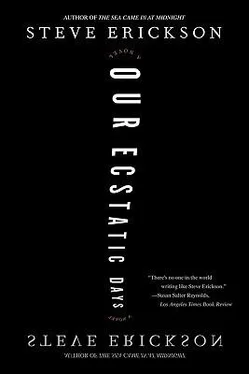“No.”
“But you would know if you heard it, right?”
“Yes, I would,” although over the years he’s become not so certain.
“They need to develop a software,” she jokes, “where you can hum it into the computer.”
“I doubt it would help. I’m not much of a singer.” The elevator stops and the doors open. They step out and, overwhelmed, she almost faints: Mega, she mutters to herself, tottering a bit where she stands and reaching for the wall beside her, almost dropping the radio. Before her a quadrant of the world lies in moonlight; she’s convinced she can see the curve of the earth in a white shimmering arc against the black of space. The river far below to the west glitters, and a lunar gale howls somewhere in the night sky beneath them. Looming overhead is a towering transmission mast three or four hundred feet high. “Sorry,” he says, “I should have prepared you. Actually,” he says, “no one ever comes to the
therefore I knew he hadn’t inherited his dreamlessness from me as I must have
top of this one, except for workmen or … that’s why we used the service lift.” About ten feet from them is some bedding, a mattress and a sleeping bag. “Sometimes I even sleep up here when conditions allow. A night like tonight,” looking around him, “you, uh, sleep above your dreams.”
“Is that good?”
“Depends on the dreams.” Thinking a moment, “In my case, it’s good.”
“I’m not going to get blown off, am I?” she says, beginning to walk around a bit, wandering the roof and circling the spire that glows above them. He doesn’t say anything for a while, lets her just walk around in the moonlight as he watches. He’s not in any great rush to take her back down and she’s not in a rush to leave. He’s aware she’s chosen not to ask too much about what he does or how he lives or, for instance, why the song for which he came to her for help is so important; as the rationalist he likes to think he is, generally unconvinced by the existence of intangibles, he probably couldn’t explain, even if he wanted to, his theory that if he could locate and fasten down in some way more permanent than the humming in his head, if he could take apart and reassemble the melody that’s been haunting him for twelve years, inside could be found (since all music is mathematic) the helix of freedom and desire, transcendence and oblivion, even (if he believed in either) god and chaos. And that this would explain his life and the great event that transfixed the world, and its secret the world never knew and that he knows but doesn’t understand. Now being up here with this girl makes him look around anew at what he’s seen many times. His gaze settles on the west river and the blasted gardens of
inherited it from my own mother who couldn ’t even cross the river to come see
smoke beyond and, three thousand miles beyond that, the woman he loves.
For a wild impetuous moment, a man who’s spent half a life meditating the laws of impulse only to reject them thinks about phoning her. It’s not too late, three-hour time difference — but he’s just not ready yet, he tells himself, not having communicated with her for a while other than in letters. So he can’t just pick up the phone and call thoughtlessly unless, of course, thoughtlessly is in fact exactly the way he should call, the only way he’ll ever bring himself to call. Not ready yet, no. Since there’s no changing the fact of her child then there’s only changing the sense of betrayal —beautiful betrayer, killer of my trust— something he thought he got over long ago, something he thought he let go of long ago, only to wake each morning and find it still in his grip or perhaps, more precisely, to find he’s still in its grip. Maybe if you can’t get over it then it’s just not going to get gotten over. It’s been six years now since the boy was born, with the father long out of the picture — he was barely in it except to make a son, which somehow only made her infidelity worse — so you just ought to get over it and if you can’t then it’s not going to get gotten over because she can’t undo it and you can’t expect she would if she could, it’s her child after all.
But not our child. And he should have been.
He turns to look another direction, anywhere but west. The girl turns her radio on low, tries to find the right soundtrack for a darkling world before her; but perhaps the only soundtrack that’s right is silence. She settles into the base of the transmission mast. She never asked why the song was so important because it wasn’t her business and’ getting right down to it, she doesn’t really care.
me, because the very first dream I ever had in my life wasn’t until that night I
With most women, she tells herself, curiosity is an unchecked reflex; perhaps I’m not the inquisitive sort. Perhaps I have an overly developed male sense of privacy — that is, for a female. Perhaps that’s why it’s women not men who have babies, because as a gender women are predisposed not only to not value privacy so much but to unconsciously abhor it like nature does a vacuum, because it’s women who are capable of that generous voluntarily surrender of profound privacy, the privacy of the body, the privacy of the heart.
I have nowhere to go tonight, it suddenly occurs to her. She watches the Asian man pacing the rooftop and then changes the station on the radio again: Are you a musicologist? she asked when he first showed up at the library, and he said no and then sometime later in the conversation revealed he had been a mathematics student in college before “history had its way with me,” by which she assumed he meant he became a history student instead — which doesn’t exactly explain, she thinks, what he’s doing operating elevators. Did you go to school in—? and then had stopped herself, checked her curiosity reflex, as much because she didn’t want to insult him. Japan? Korea? China? Thailand? can’t tell them apart, can you, she muses to herself. Well it’s true, you just can’t. The Emperor of Elevators, he’s musing to himself as he paces the rooftop not impatiently but aimlessly; he’s not yet become a man who never looks up.
To the contrary he’s a man who looks up as much as possible, who would look anywhere but ground level. East he can make out the lights of the harbor; from there his eyes follow the river north and count the bridges, contemplating the twinkling suture of the boroughs where, just at this moment, he can almost hear raven
miscarried him in Tokyo, waking and stumbling in terror through the dark to
navies surfacing from the floors of islamic oceans. Something about the night has already become familiar to him before he ever feels the tail-end of the gust, funneled hot memory brushing his face. And as he lifted his burning hand back in the Square twelve years ago to look through its new wound at the sky behind it, now he lifts the same hand not to feel the gust, since there are no nerve endings in the hand anymore to feel anything, not even so much to look at the night through the hand’s tiny window, but almost as though he expects that the lens in his palm will refract the gust and then burst into a vision, or as though perhaps the light of the moon above, shining down through the small round prism, will catch him in its spotlight. Or maybe even her. What it does cast is a moonbeam on the gust’s source — or maybe he would have shifted his gaze anyway, noting the vent in the low rectangular storage hut near the rooftop’s east edge.
By the time he reaches the vent, his mind feels about to explode.
The gust hasn’t subsided. In how many dreams in the last twelve years has he felt it blow across his face as it does now? Up here, he told her just a few minutes ago, you sleep above your dreams; so how is it his dreams have reached this altitude? How high do I have to go, he thinks to himself angrily, to rise above them once and for all? Once he wondered if this gust was an ally meaning to rescue him, or a weapon of the State meaning to remove him; but it’s really an anarchist without conviction either way, without interest in either rescue or attack. Once he stood his ground and the gust subsided, but now as he nears the vent it comes roaring out. Taking from his belt his ring of keys, he uses one to begin prying the vent loose around its rim, before he takes the vent cover in his one good hand and tears it from its space.
Читать дальше











